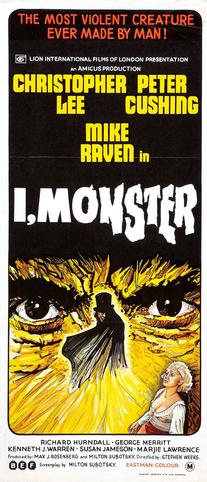I, Monster
| I, Monster | |
|---|---|
 Theatrical release poster | |
| Directed by | Stephen Weeks |
| Written by | Milton Subotsky |
| Based on | Strange Case of Dr. Jekyll and Mr. Hyde by Robert Louis Stevenson |
| Produced by | John Dark Max Rosenberg Milton Subotsky |
| Starring | Christopher Lee Peter Cushing Mike Raven Richard Hurndall George Merritt Kenneth J. Warren |
| Cinematography | Moray Grant |
| Edited by | Peter Tanner |
| Music by | Carl Davis |
| Distributed by | British Lion Films The Cannon Group |
Release dates |
|
Running time | 75 minutes 81 minutes (extended cut) |
| Country | United Kingdom |
| Language | English |
I, Monster is a 1971 British horror film directed by Stephen Weeks (his feature debut) for Amicus Productions. It is an adaptation of Robert Louis Stevenson's 1886 novella Strange Case of Dr. Jekyll and Mr. Hyde, with the main characters' names changed to Dr. Charles Marlowe and Mr. Edward Blake.[1]
Plot[]
Psychologist Charles Marlowe (Lee) invents a drug which will release his patients' inhibitions. When he tests it on himself, he becomes the evil Edward Blake, who descends into crime and eventually murder. Utterson (Cushing), Marlowe's lawyer, believes that Blake is blackmailing his friend until he discovers the truth.
Cast[]
- Christopher Lee as Marlowe / Blake
- Peter Cushing as Utterson
- Mike Raven as Enfield
- Richard Hurndall as Lanyon
- George Merritt as Poole
- Kenneth J. Warren as Deane
- Susan Jameson as Diane
- Marjie Lawrence as Annie
- Aimée Delamain as Landlady (as Aimee Delamain)
- Michael Des Barres as Boy in Alley
Production[]
It stars Christopher Lee as the doctor and his alter ego, and Peter Cushing as Frederick Utterson, a central character in Stevenson's original story. Mike Raven and Susan Jameson also star. It was photographed by Moray Grant, with music by Carl Davis.[2]
Peter Duffell, who had previously worked for Amicus, was offered the movie to direct, but turned it down.[1] Financing came from British Lion and the NFFC.[3]
It was intended to be shown in 3-D utilizing the Pulfrich effect, but the idea was abandoned upon release.[4]
Reception[]
The film performed poorly at the box office,[3] however recent reviews have praised the film for its faithful direction from the source material[5] with Drew Hunt of Chicago Reader listing it as one of Christopher Lee's five best roles.[6]
References[]
- ^ a b Hallenbeck 2015, p. 112.
- ^ Miller & Johnson 2009, p. 226.
- ^ a b Bryce 2000, p. 72-79.
- ^ Hallenbeck 2015, p. 112-115.
- ^ Hallenbeck 2015, p. 115.
- ^ Hunt 2015.
Sources[]
- Bryce, Allen (2000), Amicus: The Studio That Dripped Blood, Stray Cat Publishing Ltd, ISBN 978-0953326136
- Hallenbeck, Bruce G. (2015), The Amicus Anthology, Midnight Marquee Press, ISBN 978-1936168569
- Hunt, Drew (14 June 2015), Christopher Lee's five best performances, Chicago Reader, retrieved 22 February 2017
- Miller, Mark A.; Johnson, Tom (2009), The Christopher Lee Filmography: All Theatrical Releases, 1948-2003, McFarland & Company, ISBN 978-0786446919
External links[]
- I, Monster at IMDb
- I, Monster at AllMovie
- I, Monster at BFI Screenonline
- 1971 films
- 1973 films
- English-language films
- 1971 horror films
- British horror films
- British films
- Dr. Jekyll and Mr. Hyde films
- Golan-Globus films
- 1970s horror film stubs